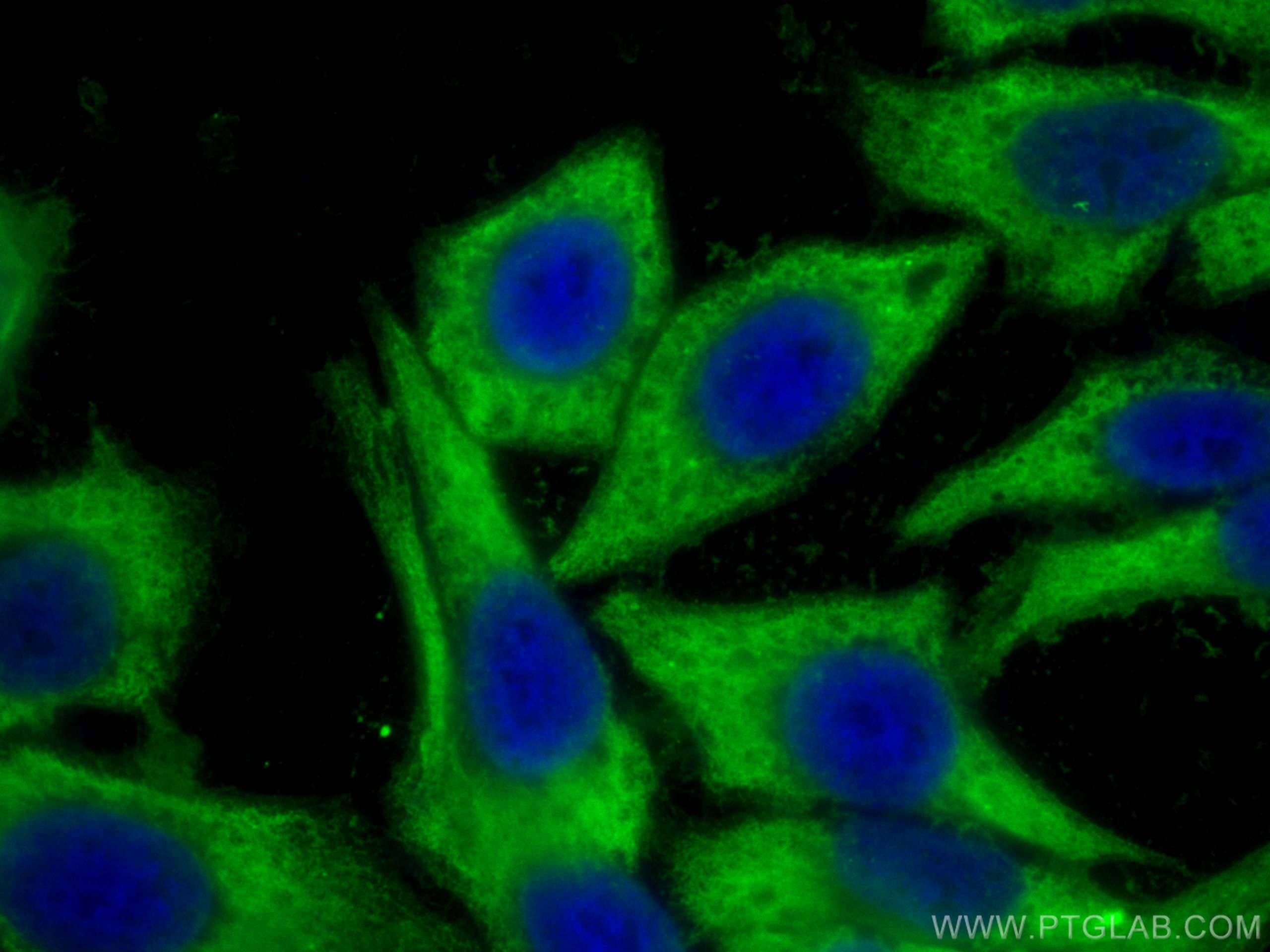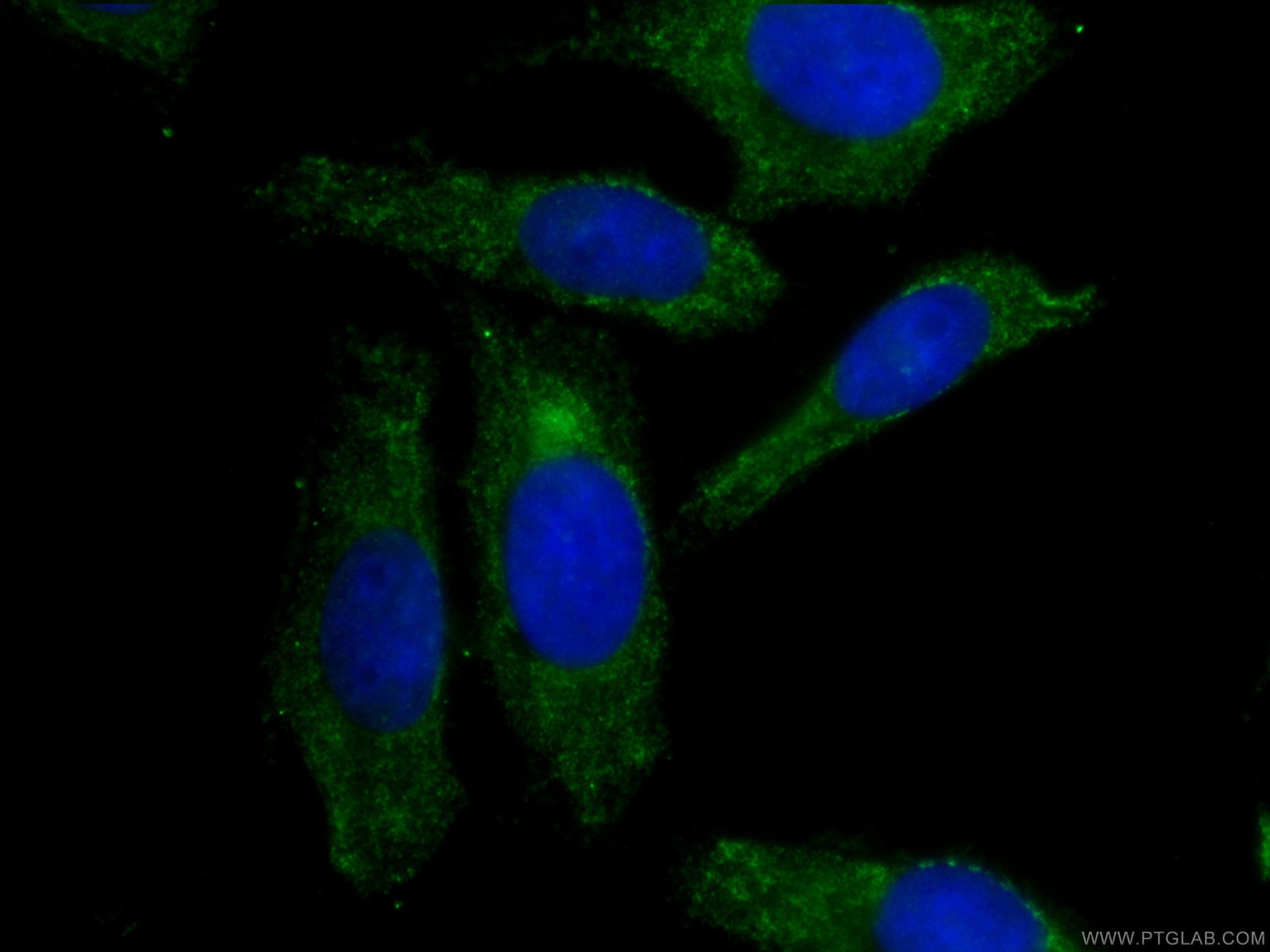Tested Applications
| Positive IF/ICC detected in | HepG2 cells |
Recommended dilution
| Application | Dilution |
|---|---|
| Immunofluorescence (IF)/ICC | IF/ICC : 1:50-1:500 |
| It is recommended that this reagent should be titrated in each testing system to obtain optimal results. | |
| Sample-dependent, Check data in validation data gallery. | |
Product Information
CL488-66124 targets APOL1-Specific in IF/ICC applications and shows reactivity with human samples.
| Tested Reactivity | human |
| Host / Isotype | Mouse / IgG2a |
| Class | Monoclonal |
| Type | Antibody |
| Immunogen |
CatNo: Ag2016 Product name: Recombinant human APOL1 protein Source: e coli.-derived, PGEX-4T Tag: GST Domain: 1-238 aa of BC017331 Sequence: MEGAALLRVSVLCIWMSALFLGVGVRAEEAGARVQQNVPSGTDTGDPQSKPLGDWAAGTMDPESSIFIEDAIKYFKEKVSTQNLLLLLTDNEAWNGFVAAAELPRNEADELRKALDNLARQMIMKDKNWHDKGQQYRNWFLKEFPRLKSELEDNIRRLRALADGVQKVHKGTTIANVVSGSLSISSGILTLVGMGLAPFTEGGSLVLLEPGMELGITAALTGITSSTMDYGKKWWTQA Predict reactive species |
| Full Name | apolipoprotein L, 1 |
| Calculated Molecular Weight | 44 kDa |
| Observed Molecular Weight | 39-45 kDa |
| GenBank Accession Number | BC017331 |
| Gene Symbol | APOL1 |
| Gene ID (NCBI) | 8542 |
| RRID | AB_2883265 |
| Conjugate | CoraLite® Plus 488 Fluorescent Dye |
| Excitation/Emission Maxima Wavelengths | 493 nm / 522 nm |
| Form | Liquid |
| Purification Method | Protein A purification |
| UNIPROT ID | O14791 |
| Storage Buffer | PBS with 50% glycerol, 0.05% Proclin300, 0.5% BSA, pH 7.3. |
| Storage Conditions | Store at -20°C. Avoid exposure to light. Stable for one year after shipment. Aliquoting is unnecessary for -20oC storage. |
Background Information
Human apolipo-protein L1 (APOL1) is a minor component of plasma high density lipoprotein (HDL) particles, acting as an interacting protein of apolipoprotein A1 (ApoA1). The human ApoL protein family was thought to be predominantly involved in lipid transport and metabolism. APOL1 is also involved in host innate immunity against Trypanosoma parasites. Once activated, APOL1 can lyse the parasite and protect human from infection. Genetic variants in APOL1 gene, which are found in African ancestry with high frequency, associate with chronic kidney disease, like focal segmental glomerulosclerosis (FSGS), HIV-associated nephropathy (HIVAN), and hypertensive nephropathy. APOL1 share structural and functional similarities with proteins of the Bcl-2 family and may has roles in apoptosis and autophagy. It is notable that APOL1 exists only in human and a few other primate species, and mouse does not express an APOL1 orthologue. This antibody recognizes the endogenous ApoL1 of 39-45 kDa in blood lysate.
Protocols
| Product Specific Protocols | |
|---|---|
| IF protocol for CL Plus 488 APOL1-Specific antibody CL488-66124 | Download protocol |
| Standard Protocols | |
|---|---|
| Click here to view our Standard Protocols |






